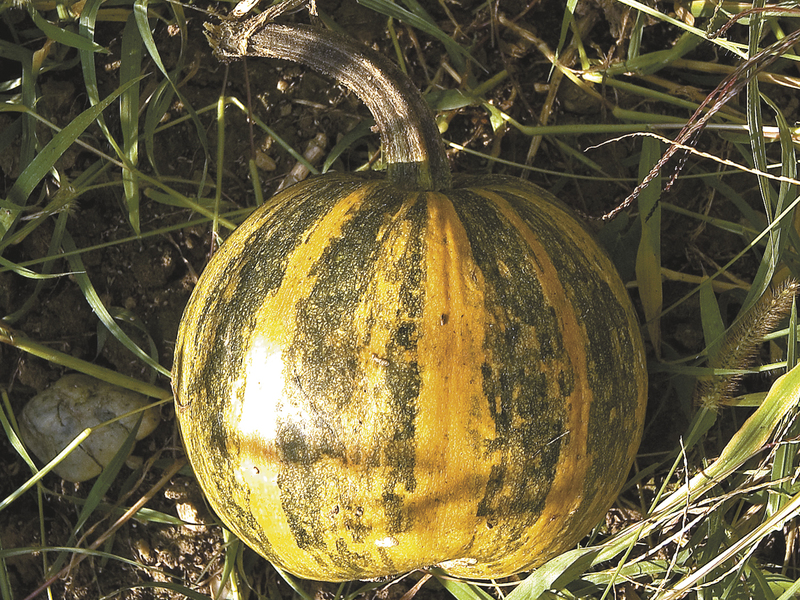Hand-me-downs are the bane of many a kid. Hand-me-downs are too often ill-fitting, horribly tailored or just goofy clothes from another era, but sometimes some of the best things in life are hand-me-downs. Thelma Sanders of Adair County, Mo., grew cream-colored acorn squash that in her own words is “fine meated, better than sweet potatoes.”
Thelma’s squash might have remained a local sensation, or worse, become extinct if she ever stopped growing it. Fortunately she gave seeds, a living hand-me-down, to Evert Pitt who grew it, and liked it. He passed the seeds to Tom Knoche, an Ohio member of the Seed Savers Exchange. Seed Savers Exchange is a nonprofit seed bank whose members swap seeds of heirloom vegetables. Tom began offering the seeds to members of Seed Savers Exchange in 1981.
Thelma’s squash really does taste like sweet potatoes, is easy to grow, and produces huge amounts of fruit.
Besides the striking creamy color of Thelma Sanders Sweet Potato Squash (Cucurbita pepo) this is an enormously productive variety whose smaller-size fruits are perfect for smaller servings. The vigorous vines yield several seven-to-eight-inch-long, two-pound squash with deep ridges. The flavor is what makes this worth growing. The rich golden interior flesh has a distinctive flavor that seems to combine the taste of sweet potatoes and roasted chestnuts. Use it as you would any acorn squash. Besides baked with brown sugar, try Thelma Sanders Sweet Potato Squash in cream soup, as filling for ravioli, or sweetened and mixed with beaten eggs for savory pie. Thelma Saunders Sweet Potato Squash has a hard skin and stores very well.
Since acorn squash seedlings grow best when their roots aren’t disturbed, it is best to sow the seeds directly into the garden. If you must start them indoors, plant two to three seeds each in individual peat pots. Thin with scissors to a single plant per pot.
For best results sow seeds right in the garden. Choose a spot with plenty of direct full sun. Your soil should have a pH between 5.8 and 6.8. Dig the soil down a good eight to 10 inches and plant six to eight seeds one inch deep in hills. Space the hills about six feet apart in all directions. Keep the plants well watered but not soggy.
Seeds for Thelma Sanders Sweet Potato Squash are available from many sources such as Seed Savers Exchange (www.seedsavers.org, 3094 North Winn Road, Decorah, Iowa 52101; phone: 563-382-5990); Baker Creek Heirloom Seed Co. (www.rareseeds.com, 2278 Baker Creek Road, Mansfield, MO 65704; phone: 417-924-8917); Territorial Seed Company (www.territorialseed.com, PO Box 158, Cottage Grove, OR 97424; phone 800-626-0866) and Southern Exposure Seed Exchange (www.southernexposure.com, P.O. Box 460, Mineral, VA 23117; phone: 540-894-9480).
You can easily save seeds of your Thelma Sanders Sweet Potato Squash. Be careful because any nearby squash within the same species will cross-pollinate and ruin your seed crop. You can isolate each species by ¼ mile or carefully tape the blossoms shut and hand pollinate them. You can also put a cloth bag over the unopened female blossom, hand pollinate it with a male blossom and then close the bag up until the squash has begun to form and the flower has fallen off. Remove the bag and let the squash grow normally. The healthiest seeds are from squash that are a bit overripe by three weeks. Scoop the seeds out and wash away the fiber. Carefully dry them out of direct sunlight.
Even though Thelma Sanders passed away in 1998, her hand-me-down lives on, not only as a family heirloom, but as a generous living gift for gardeners and cooks everywhere.























































